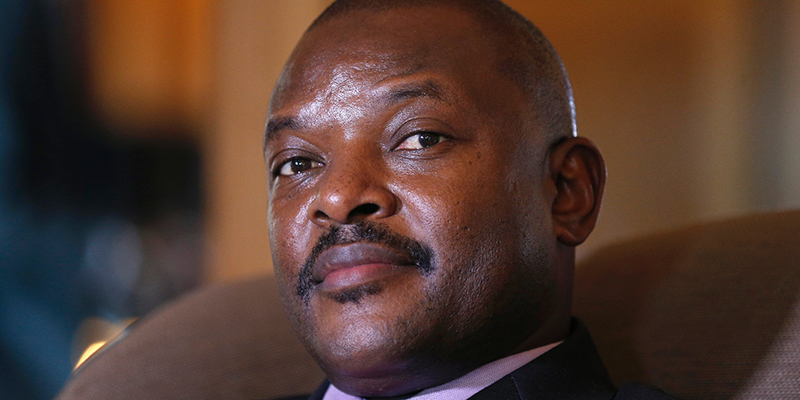Analysis
African leaders will never learn

President Pierre Nkurunziza
Borders are closed. Airport is closed that is why President Pierre Nkurunziza has not flown back to the country he left as its president.
What better way of showing that Nkurunziza may actually have been dethroned even though he still says through the media that he is still in charge of Burundi. The fact that he has not been able to go back home by air or land, you begin to wonder whether he is still enjoying the security and protection of the security of his government forces.
No other planes are by the way landing in Bujumbura either. It was this week reported that a Brussels airline flight destined for Bujumbura was diverted to Nairobi on the instructions of the people in charge at the airport in Bujumbura.
So how did we get here? Apparently, a president is allowed to serve only two terms which the current president, Pierre Nkurunziza had already served. But he wanted to serve another term and his people said No. instead of respecting the wishes of his people and standing down, he decided that he would not stand down ‘because he had broken no law’.
What followed were weeks of steadfast rebellion that was met with government hostility. A number of people were killed and hundreds were forced to leave Burundi and seek safety in the neighbouring countries. As violence continued, the leaders and peoples of the region decided to speak out.
Three weeks ago Tanzanian President Kikwete warned Burundi President Pierre Nkurunziza against third term ambition because it was clear from open resistance by the people of Burundi on the streets that it was not a popular idea.
The protests by ordinary Burundians on streets without fear from government forces clearly showed that the people had overcome fear from the visible brutality of the police forces using teargas and live ammunitions. And that it was clear that any attempt by the president to to stay in power for another term without the support from his people, would cause instability in Burundi, a situation that did not have support from the international community.
Nkurunziza refused to listen. Just before Kikwete’s warning and proceeded to prepare for elections even when he could see that his continued stay in power wasn’t popular among his people regardless of the numbers. Realising that there was an impeding problem in the neighbourhood, President Paul Kagame of the neighbouring Rwanda, while on a foreign visit to Switzerland to attend the 45th St. Gallen Symposium early this month, when asked by the Chinese CCTV what he thought about the state of insecurity in his neighbouring Burundi, he is reported to have categorically said: ‘if citizens tell their leader that they no longer want him or her to lead them, the right thing for that leader to do is to leave’. He went further to explain to the media that the resistance in Bujumbura was not about “Third Term’ but against failure of delivery of services to the people of Burundi hence their protestations.
Before making that statement to the media abroad, he had been reported to have met with President Nkurunziza. We can therefore only assume that they must have discussed insecurity in Burundi as neighbours. Again, Nkurunziza refused to stand down arguing that his country’s court had cleared him to stand for a third term even when the constitution talks of Two Terms.
About two weeks ago, after the UN Secretary General’s appeal to President Museveni to help pacify Burundi, it was reported in some sections of the media that President Museveni had warned Pierre Nkurunziza against going against his country’s constitution and against the advice of the East African Community resolution clearly spelling out how many terms a President of Burundi should serve if Burundi had to remain peaceful.
Nkurunziza was adamant, refused to stand down sparking off serious protests that culminated into a coup while he was out of the country to meet leaders whose advice he had refused to take. Whatever he was thinking!
Should it be surprising that when Tanzanian president Jakaya Kikwete was reacting to the attempted coup as they met in the Tanzanian town of Arusha, he called for the return of the Rule of Law and Constitutionalism, and the end of violence in Burundi? He then added, ‘”The region will not accept, nor will the region stand by, if violence does not stop or escalates in Burundi.”
What we are now witnessing in Bujumbura is really what common sense had anticipated – a resistance that would most likely lead in a regime change in Burundi. The forces of coercion have decided to side with the People, the violence as demanded by the East African leaders through Kikwete has ceased, and the ‘President’ is nowhere to be seen.
The leaders of the region may have condemned the coup, unfortunately it is too little too late because many lives would have been saved if the leaders of the region had spoken earlier and strongly. Nevertheless, now that the killing of the people of Burundi has stopped, the world should help the people of Burundi create a democratic government that they have had to shed blood to bring about.
Comments


















